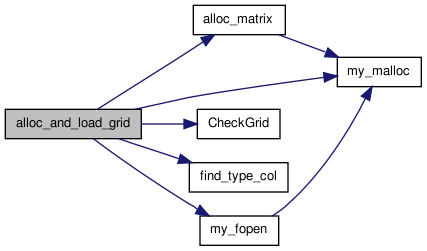 This graph shows which files directly or indirectly include this file:
This graph shows which files directly or indirectly include this file:Go to the source code of this file.
Defines | |
| #define | SETUPGRID_H |
Functions | |
| void | alloc_and_load_grid (INOUTP int *num_instances_type) |
| void | freeGrid () |
Define Documentation
| #define SETUPGRID_H |
Definition at line 2 of file SetupGrid.h.
Function Documentation
| void alloc_and_load_grid | ( | INOUTP int * | num_instances_type | ) |
[0..num_types-1]
Create and fill FPGA architecture grid.
Definition at line 24 of file SetupGrid.c.
{
int i, j;
t_type_ptr type;
#ifdef SHOW_ARCH
FILE *dump;
#endif
/* To remove this limitation, change ylow etc. in t_rr_node to *
* * be ints instead. Used shorts to save memory. */
if((nx > 32766) || (ny > 32766))
{
printf("Error: nx and ny must be less than 32767, since the \n");
printf("router uses shorts (16-bit) to store coordinates.\n");
printf("nx: %d. ny: %d.\n", nx, ny);
exit(1);
}
assert(nx >= 1 && ny >= 1);
grid = (struct s_grid_tile **)alloc_matrix(0, (nx + 1),
0, (ny + 1),
sizeof(struct s_grid_tile));
/* Clear the full grid to have no type (NULL), no capacity, etc */
for(i = 0; i <= (nx + 1); ++i)
{
for(j = 0; j <= (ny + 1); ++j)
{
memset(&grid[i][j], 0, (sizeof(struct s_grid_tile)));
}
}
for(i = 0; i < num_types; i++)
{
num_instances_type[i] = 0;
}
/* Nothing goes in the corners. */
grid[0][0].type = grid[nx + 1][0].type = EMPTY_TYPE;
grid[0][ny + 1].type = grid[nx + 1][ny + 1].type = EMPTY_TYPE;
num_instances_type[EMPTY_TYPE->index] = 4;
for(i = 1; i <= nx; i++)
{
grid[i][0].blocks =
(int *)my_malloc(sizeof(int) * IO_TYPE->capacity);
grid[i][0].type = IO_TYPE;
grid[i][ny + 1].blocks =
(int *)my_malloc(sizeof(int) * IO_TYPE->capacity);
grid[i][ny + 1].type = IO_TYPE;
for(j = 0; j < IO_TYPE->capacity; j++)
{
grid[i][0].blocks[j] = EMPTY;
grid[i][ny + 1].blocks[j] = EMPTY;
}
}
for(i = 1; i <= ny; i++)
{
grid[0][i].blocks =
(int *)my_malloc(sizeof(int) * IO_TYPE->capacity);
grid[0][i].type = IO_TYPE;
grid[nx + 1][i].blocks =
(int *)my_malloc(sizeof(int) * IO_TYPE->capacity);
grid[nx + 1][i].type = IO_TYPE;
for(j = 0; j < IO_TYPE->capacity; j++)
{
grid[0][i].blocks[j] = EMPTY;
grid[nx + 1][i].blocks[j] = EMPTY;
}
}
num_instances_type[IO_TYPE->index] = 2 * IO_TYPE->capacity * (nx + ny);
for(i = 1; i <= nx; i++)
{ /* Interior (LUT) cells */
type = find_type_col(i);
for(j = 1; j <= ny; j++)
{
grid[i][j].type = type;
grid[i][j].offset = (j - 1) % type->height;
if(j + grid[i][j].type->height - 1 - grid[i][j].offset >
ny)
{
grid[i][j].type = EMPTY_TYPE;
grid[i][j].offset = 0;
}
if(type->capacity > 1)
{
printf(ERRTAG
"In FillArch() expected core blocks to have capacity <= 1 but "
"(%d, %d) has type '%s' and capacity %d\n",
i, j, grid[i][j].type->name,
grid[i][j].type->capacity);
exit(1);
}
grid[i][j].blocks = (int *)my_malloc(sizeof(int));
grid[i][j].blocks[0] = EMPTY;
if(grid[i][j].offset == 0)
{
num_instances_type[grid[i][j].type->index]++;
}
}
}
CheckGrid();
#ifdef SHOW_ARCH
/* DEBUG code */
dump = my_fopen("grid_type_dump.txt", "w", 0);
for(j = (ny + 1); j >= 0; --j)
{
for(i = 0; i <= (nx + 1); ++i)
{
fprintf(dump, "%c", grid[i][j].type->name[1]);
}
fprintf(dump, "\n");
}
fclose(dump);
#endif
}
 Here is the call graph for this function:
Here is the call graph for this function: Here is the caller graph for this function:
Here is the caller graph for this function:| void freeGrid | ( | ) |
Definition at line 156 of file SetupGrid.c.
{
int i, j;
for(i = 0; i <= (nx + 1); ++i)
{
for(j = 0; j <= (ny + 1); ++j)
{
free(grid[i][j].blocks);
}
}
free_matrix(grid, 0, nx + 1, 0, sizeof(struct s_grid_tile));
}
 Here is the call graph for this function:
Here is the call graph for this function: Here is the caller graph for this function:
Here is the caller graph for this function:




